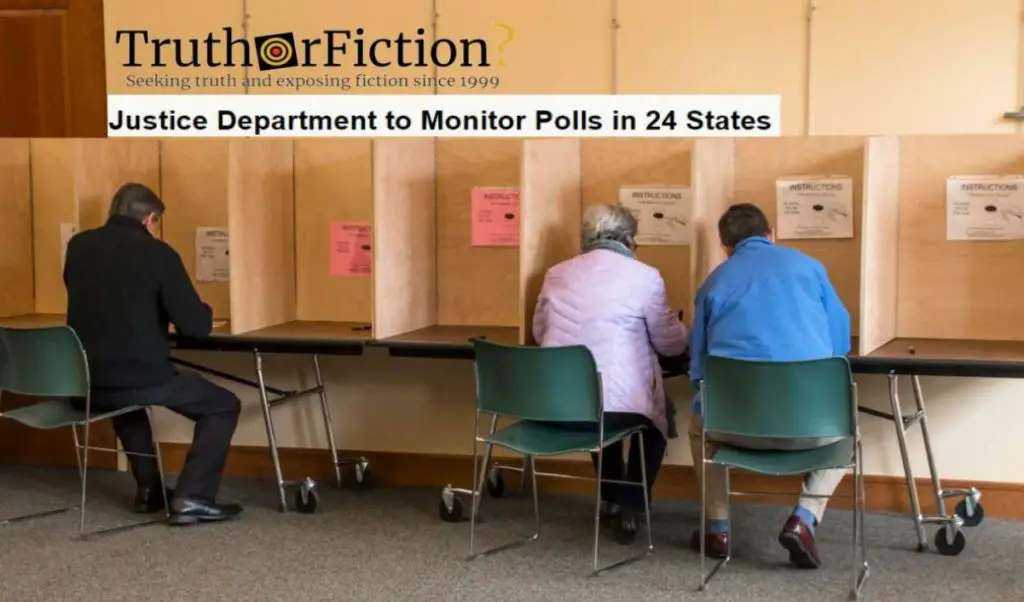The Department of Justice (DOJ) will monitor polls in Maricopa County, Arizona — which has seen an influx of armed right-wing operatives harassing voters — as well as polls in 63 other locations across the United States in the November 8 2022 midterm elections.
“Monitors will include personnel from the Civil Rights Division and from U.S. Attorneys’ Offices,” the DOJ said in a statement a day prior to the election. “In addition, the division also deploys monitors from the Office of Personnel Management, where authorized by federal court order. Division personnel will also maintain contact with state and local election officials.”
Fact Check
Claim: The Justice Department will monitor the Midterm Election Polls
Description: The Department of Justice (DOJ) has announced that they will monitor polls in Maricopa County, Arizona, where there have been reports of armed right-wing operatives harassing voters, as well as polls in 63 other locations across the United States for the November 8 2022 midterm elections. This is in response to several instances of voter suppression and related issues.
The DOJ’s announcement came five days after a federal judge imposed a restraining order against people purportedly acting on behalf of the conspiracist group “Clean Elections USA,” staking out ballot drop boxes in Maricopa County and reportedly harassing voters.
The department will also send monitors to three counties in Texas, which rejected 25,000 mail-in ballots and 12,000 absentee ballot applications during the March 2022 primary elections, according to a report by the Brennan Center for Justice.
The Brennan Center, a nonpartisan legal group, blamed the suppression effort on Senate Bill 1, which was enacted by the right-wing Texas legislature in 2021; the group’s analysis found that there were clear effects on non-white populations:
We found that the overwhelming majority of ballot rejections were due to the new ID number requirements imposed by S.B. 1 and that Latino, Asian, and Black voters were significantly more likely to have their mail ballot applications rejected than white voters. We also found that even when voters successfully applied to vote by mail, voters of color were far more likely to have their mail ballots rejected. This combination of application and mail ballot rejections left nonwhite voters at least 30 percent more likely to have an application or mail ballot rejected than white voters.
The Justice Department will also monitor one county in Missouri, where a state judge has blocked enforcement of House Bill 1878, which required residents to show “non-expired, government-issued” identification to be able to vote (meaning no school student ID cards) and also restricted voter registration drives. The law was challenged in court by the state chapters of both the League of Women Voters and the National Association for the Advancement of Colored People (NAACP).
The St. Louis Post-Dispatch reported that state attorney-general Jay Ashcroft — a Republican who is seeking to run for governor in 2024 — accused the DOJ of possibly “intimidating Missouri voters” by monitoring the polls in Cole County, where the state Capitol of Jefferson City is located.
According to the newspaper, Assistant U.S. Attorney Charles M. Thomas contacted County Clerk Steve Korsmeyer seeking to meet and discuss a plan for DOJ observers to work with attorneys monitoring voting for disabled residents.
“Rest assured that we understand that you will be administering the election and we will try to minimize the time we spend at each site,” Thomas said in an email to Korsmeyer.
A full list of DOJ monitoring locations by state follows below:
- Alaska: City of Bethel; Dillingham Census Area; Kusilvak Census Area; Sitka City-Borough.
- Arizona: Maricopa County; Navajo County; Pima County; Pinal County; Yavapai County.
- Arkansas: Newton County.
- California: Los Angeles County and Sonoma County.
- Florida: Broward County; Miami-Dade County; Palm Beach County.
- Georgia: Cobb County; Fulton County; Gwinnett County.
- In Massachusetts, the following cities: Everett; Fitchburg; Leominster; Malden; Methuen; Randolph; Salem.
- Maryland: Prince George’s County.
- In Michigan, the following cities: Detroit; Flint; Grand Rapids; Pontiac; Southfield.
- Minnesota: City of Minneapolis; Hennepin County; Ramsey County.
- Missouri: Cole County.
- North Carolina: Alamance County; Columbus County; Harnett County; Mecklenburg County; Wayne County.
- New Jersey: Middlesex County.
- New Mexico: Bernalillo County; San Juan County.
- Nevada: Clark County; Washoe County.
- New York: Queens County.
- Ohio: Cuyahoga County.
- Pennsylvania: Berks County; Centre County; Lehigh County; Luzerne County; Philadelphia County.
- Rhode Island: City of Pawtucket.
- South Carolina: Horry County.
- Texas: Dallas County; Harris County; Waller County.
- Utah: San Juan County.
- In Virginia, the cities of Manassas and Manassas Park; and Prince William County.
- In Wisconsin, the cities of Milwaukee and Racine.
- Justice Department to Monitor Polls in 24 States for Compliance with Federal Voting Rights Laws
- Records Show Massive Disenfranchisement and Racial Disparities in 2022 Texas Primary
- Missouri's New Election Law Restricts Registration Drives, Requires Photo ID
- VICTORY: Missouri Judge Blocks Restrictions on Voter Registration Activity and Distribution of Absentee Ballot Applications
- Missouri Officials Sparring With Feds Over Election Monitoring

